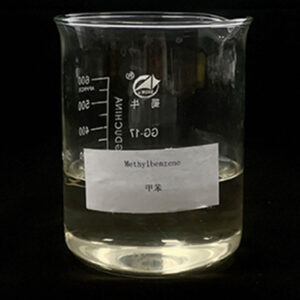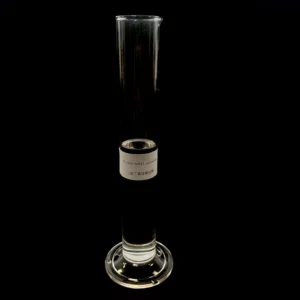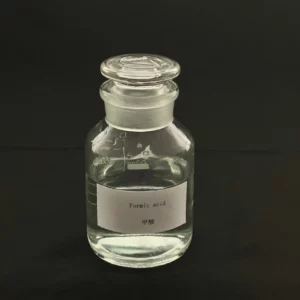An clóiríd phosphoryl ceimiceach Tá ról ríthábhachtach aige i bpróisis thionsclaíocha éagsúla. Ar a dtugtar as a solúbthacht, feidhmíonn sé mar imoibrí tábhachtach i dtáirgeadh cógaisíochta, agraiceimiceacha, agus ceimiceáin eile. Is féidir le tuiscint a fháil ar a fheidhm agus a bhfeidhmeanna léargas a thabhairt ar an bhfáth go mbíonn tionscail ag brath go mór air.

Ról Chlóiríd Fhosfarail i dTionscal
Feidhmíonn sé go príomha mar oibreán clóirínithe. Mar gheall ar a chumas adaimh chlóirín a thabhairt isteach i móilíní eile tá sé fíor-riachtanach i sintéis cheimiceach. Mar shampla, sa tionscal cógaisíochta, cuidíonn sé le comhábhair ghníomhacha a tháirgeadh i roinnt cógas. Lasmuigh Clóiríd Phosphoryl, bheadh sé dúshlánach go leor drugaí riachtanacha a mhonarú.
Baineann iarratas suntasach eile le táirgeadh agrochemicals. Is minic a éilíonn lotnaidicídí agus luibhicídí adaimh chlóirín chun a n-éifeachtacht a fheabhsú. seo ceimiceán éascaíonn sé seo trí chlóirín a chur leis na comhdhúile seo go héifeachtach. Mar thoradh air sin, cabhraíonn sé le barra a chosaint ó lotnaidí agus galair, ag cur le táirgeacht talmhaíochta níos airde.
Mar a Idirghníomhaíonn Clóiríd Fosfarile le Tríchlóiríd Fosfar
Trichloride fosfair feidhmíonn sé mar réamhtheachtaí do Clóiríd Phosphoryl. Sa tsaotharlann, Trichloride fosfair imoibríonn le hocsaigin nó clóirín a tháirgeadh Clóiríd Phosphoryl. Tá an claochlú seo ríthábhachtach toisc go gcumasaíonn sé táirgeadh ar scála mór Clóiríd Phosphoryl le haghaidh úsáid thionsclaíoch.
An gaol idir Trichloride fosfair is Clóiríd Phosphoryl léiríonn sé idirnascacht na bpróiseas ceimiceach. Monarcha a tháirgeann Trichloride fosfair suite in aice le go minic Clóiríd Phosphoryl áiseanna déantúsaíochta. Cinntíonn an ghaireacht seo soláthar seasta amhábhar agus laghdaítear costais iompair.
An Tábhacht a bhaineann le Monarchan Tríchlóiríde Fosfar
A Monarcha trichloride fosfair riachtanach sa tionscal ceimiceach. Soláthraíonn sé Trichloride fosfair chuig earnálacha éagsúla, lena n-áirítear táirgeadh clóiríd phosphoryl ceimiceach. Sin na monarchana seo, chuirfí isteach go mór ar tháirgeadh ceimiceán iomadúla.
De ghnáth oibríonn na monarchana seo faoi rialacháin dhian sábháilteachta. Trichloride fosfair is substaint ghuaiseach é, agus teastaíonn trealamh speisialaithe agus pearsanra oilte chun é a láimhseáil. A Monarcha trichloride fosfair cloí le caighdeáin chomhshaoil chun an baol timpistí a íoslaghdú agus a thionchar ar an gcomhshaol a laghdú.
Thairis sin, a Monarcha trichloride fosfair rannchuidíonn sé leis an ngeilleagar trí phoist a chruthú agus trí thacú le tionscail ghaolmhara. Táirgeadh na Trichloride fosfair éilíonn amhábhair, iompair, agus seirbhísí cothabhála, a ghineann gníomhaíocht eacnamaíoch.
Aistriú go Cleachtais Níos Sábháilte agus Níos Inbhuanaithe
De réir mar a leanann tionscail ag brath ar clóiríd phosphoryl ceimiceach is Trichloride fosfair, tá fócas méadaithe ar shábháilteacht agus inbhuanaitheacht. Tá monaróirí ag fiosrú bealaí chun tionchar comhshaoil na gceimiceán seo a laghdú. Mar shampla, tá modhanna athchúrsáil á bhforbairt ag cuid acu clóiríd phosphoryl ceimiceach nó imoibrithe malartacha a aimsiú nach bhfuil chomh díobhálach céanna.
Ina theannta sin, d'fheabhsaigh dul chun cinn sa teicneolaíocht éifeachtacht na Monarcha trichloride fosfair oibríochtaí. Laghdaíonn trealamh nua-aimseartha dramhaíl agus tomhaltas fuinnimh, an próiseas táirgthe a dhéanamh níos inbhuanaithe. Téann na forbairtí seo chun tairbhe ní amháin don chomhshaol ach do bhunlíne na monaróirí freisin.
Feidhmchláir Chlóiríd Fhosfarail sa Todhchaí
Todhchaí na clóiríd phosphoryl ceimiceach cuma an-gealtach de réir mar a thagann feidhmchláir nua chun cinn. Tá taighdeoirí ag fiosrú a úsáid in ardábhair agus leictreonaic. Mar shampla, clóiríd phosphoryl ceimiceach ról a bheith aige i dtáirgeadh leathsheoltóirí nó comhpháirteanna ardteicneolaíochta eile.
Chomh maith leis sin, an t-éileamh ar clóiríd phosphoryl ceimiceach i dtíortha i mbéal forbartha táthar ag súil go dtiocfaidh fás. De réir mar a thionscnaíonn na geilleagair seo, méadófar an gá atá le ceimiceáin a úsáidtear sa chógaisíocht agus sa talmhaíocht. Is dócha go spreagfaidh an treocht seo tuilleadh infheistíochta in Monarcha trichloride fosfair oibríochtaí chun freastal ar éileamh domhanda.
Deireadh
Mar fhocal scoir, an clóiríd phosphoryl ceimiceach is imoibrí ilúsáideach agus riachtanach i dtionscail éagsúla. A chaidreamh le Trichloride fosfair béim ar an tábhacht a bhaineann le Monarcha trichloride fosfair oibríochtaí sa slabhra soláthair ceimiceach. De réir mar a thagann tionscail chun cinn, an fócas ar shábháilteacht, inbhuanaitheacht, agus cruthóidh feidhmchláir nua todhchaí na clóiríd phosphoryl ceimiceach léiriúchán. Trí thuiscint a fheidhm agus a thábhachtaí, is féidir linn meas a bheith againn ar an ról a imríonn sé i ndéantúsaíocht nua-aimseartha agus ar a acmhainneacht le haghaidh nuálaíochtaí amach anseo.




